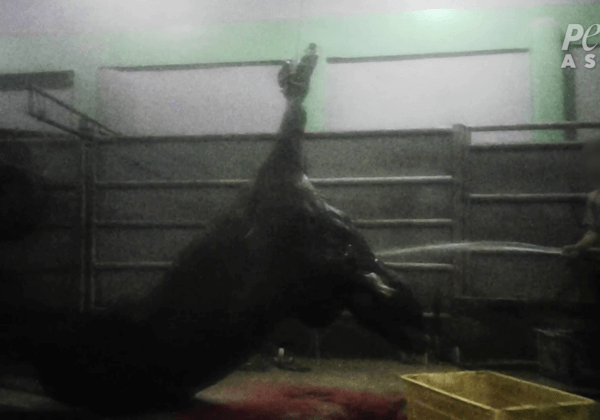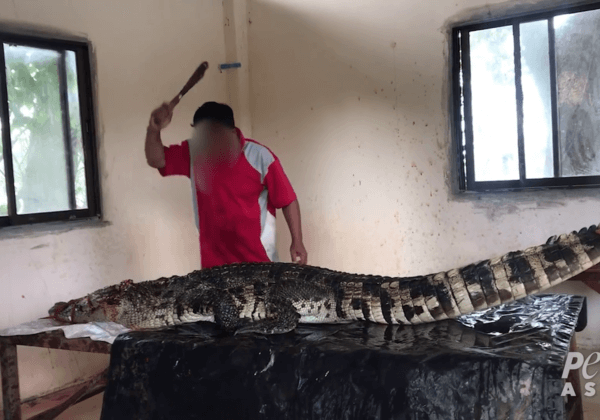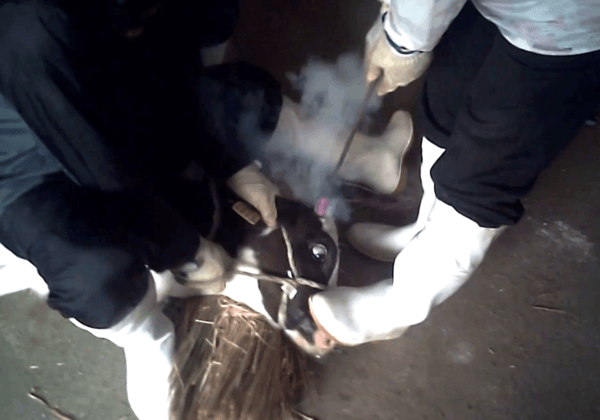Investigation of Vietnamese Dog Breeders: Illness, Injuries, and Mutilations
For several months in 2022, PETA investigators visited the facilities of more than 10 Vietnamese dog breeders—including some that are certified by the Vietnam Kennel Association—and found appalling cruelty to animals at every one. They also visited a live-animal market where puppies were sold alongside female dogs who had been used for breeding and whose bodies were so worn out that they could no longer reproduce and were considered useless. PETA is now calling on the Minister of Agriculture and Rural Development to investigate these puppy mills for possible violations of the Law on Veterinary Medicine (2015) and the Law on Animal Husbandry (2018).
This video shows just some of the abuse that the investigators documented:
Dogs were confined to cages not much larger than their own bodies and forced to sit, stand, or lie on hard plastic or wire floors that were often covered with urine and feces. The wires cut into their sensitive feet and made every movement difficult and uncomfortable. A veterinarian who reviewed the footage stated that wire floors could cause permanent damage to dogs’ paws and nails, severe injuries from falling through gaps, pressure sores, and skin ulcers.
In my professional opinion, the dogs at these facilities experience unacceptable suffering and pain and inhumane treatment.
The dogs had no enrichment, no toys, and not even a blanket for comfort. One dog chewed on the sharp, broken metal edges of his kennel, an abnormal behavior that the vet determined was caused by the stress of intensive and inappropriate confinement. The dog may have sustained cuts, puncture wounds, or broken teeth and developed an infection.
Many dogs spun in circles inside their miserably small enclosures or jumped or barked incessantly—other abnormal, stereotypical types of behavior caused by frustration, anxiety, and psychological distress. Dogs often had little access to food and water and were filthy from neglect. Many had overgrown nails, matted fur or bald patches, or skin inflammation, scaling, and scabbing. Some had developed fungal infections. A breeder confessed that he had shaved all the dogs’ fur because he hadn’t bathed them for months.
Illnesses and injuries were rampant. Some dogs were shaking and couldn’t stand properly. One breeder blamed their condition on calcium deficiency from constant breeding, nursing, and lack of sun exposure, while another attributed it to lung disease. A puppy lying on his side appeared unable to stand, which the vet determined could indicate illness, a muscular or neurological condition, or an injury. One dog appeared to be frozen in place, flinching but not responding when her cagemate jumped on her, which the vet attributed to severe untreated pain, serious illness, or both. The dogs didn’t appear to have received any veterinary care, and they were made to endure constant suffering.
Breeders with no veterinary credentials or experience chopped off part of some puppies’ tails, claiming that dogs with cut tails sell better. In one facility, a breeder confessed that she had given a dog to her daughter, who kept beating the animal and broke the dog’s leg. Many dogs cowered and froze when workers approached, indicating fear and anxiety, possibly due to physical abuse.
Breeders said that the dogs are impregnated twice a year for five or six years. When their bodies wear out from the strain of pregnancy, giving birth, and poor health and they can no longer produce as many puppies, they’re either impregnated once a year until they die or sold on Facebook or at live-animal markets, where many of them are crammed so tightly into enclosures that they’re forced to stand on top of one another and dogs on the bottom can be smothered. Others huddle and shake as they’re pelted by rain.
 Some of these breeders supply AZPET—one of the biggest animal-breeding and pet supply companies in Vietnam. They also sell online and ship dogs across the country. Most breeders and sellers make false claims about the animals’ welfare, which are almost never investigated or substantiated. Cruelty remains rampant in the dog-breeding industry, but these puppy mills continue to operate legally and profitably.
Some of these breeders supply AZPET—one of the biggest animal-breeding and pet supply companies in Vietnam. They also sell online and ship dogs across the country. Most breeders and sellers make false claims about the animals’ welfare, which are almost never investigated or substantiated. Cruelty remains rampant in the dog-breeding industry, but these puppy mills continue to operate legally and profitably.
In addition to the immense suffering that breeders inflict on the dogs they use and sell, they exacerbate the crisis of animal homelessness, hurting all dogs who find themselves turned in at shelters or struggling to survive on the streets. Breeding can never be responsible in a world teeming with animals who are desperate for homes. If you care about dogs, always adopt them—and never buy from a pet shop, breeder, or puppy mill.









